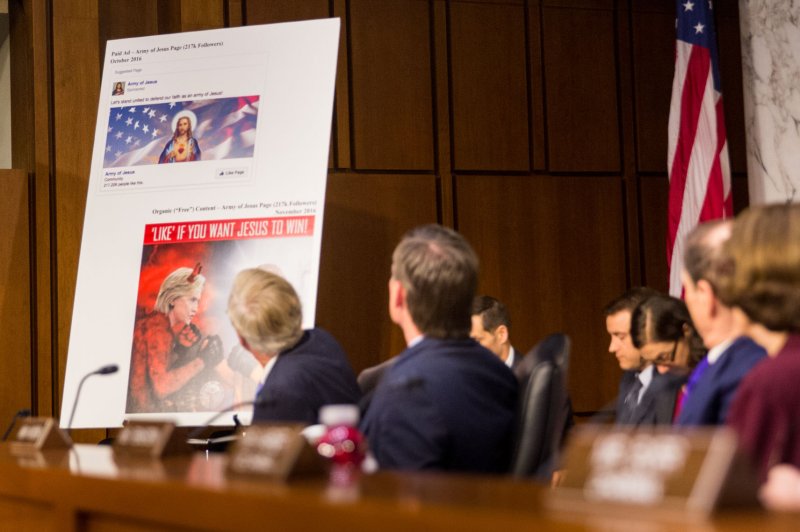Senators on the intelligence committee look at a poster depicting an example of a divisive internet advertisement on November 1, 2017. Thursday, Democrats on the panel released thousands of Russian-bought ads that appeared on social platforms like Facebook and Instagram. File Photo by Erin Schaff/UPI |
License Photo
May 10 (UPI) -- Democrats on the House intelligence committee released Thursday more than 3,000 Russian-bought ads that aimed to divide Americans on social media with politically charged messages before and after the 2016 election.
Issues like gun control, race relations, gay rights and immigration make up most of the ads' content, created by the Kremlin-linked Internet Research Agency.
"There's no question that Russia sought to weaponize social media platforms to drive a wedge between Americans, and in an attempt to sway the 2016 election," Rep. Adam Schiff, D-Calif., ranking Democrat on the committee, said in a statement.
The ads included content directed at African Americans, using the Black Lives Matter campaign, and also users in cities with controversial issues like high-profile police shootings. Some of the messages included the controversial Confederate flag and monuments.
Schiff posted examples of the ads on Twitter, saying, "They sought to harness Americans' very real frustrations and anger over sensitive political matters to influence our thinking, voting and behavior. They created online communities that appeared organic and American, but were really run by a troll farm in St. Petersburg."
About 3,400 advertisements were included in the release Thursday. Panel Democrats said they appeared on Facebook and Instagram. The Democrats said more than 11 million U.S. users were exposed to them.
"We were too slow to spot this type of information operations interference," Facebook said in a blog post following the ads' release.
The company also outlined several changes it has already made to its ad policies.
Last month, Facebook CEO Mark Zuckerberg pledged greater attention to privacy and security during an appearance in Congress, spurred by a scandal involving personal data of nearly 87 million Facebook users obtained by British research firm Cambridge Analytica before the 2016 U.S. presidential election.















